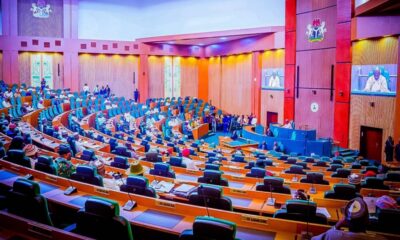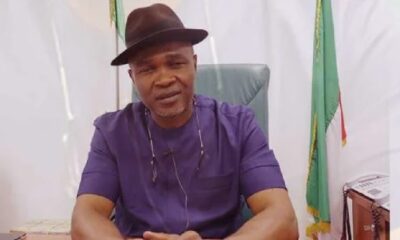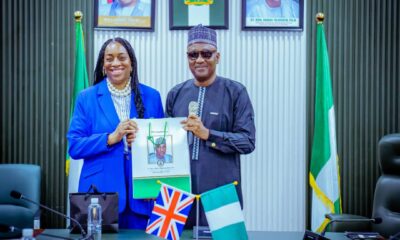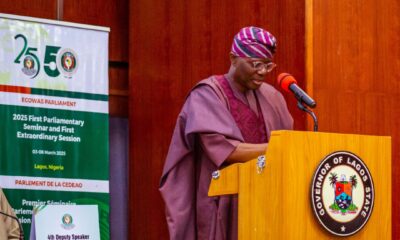News
Shift to Parliamentary system of govt: We’re advocating for an homegrown system that’ll benefit all Nigerians-Rep Chinda+Video
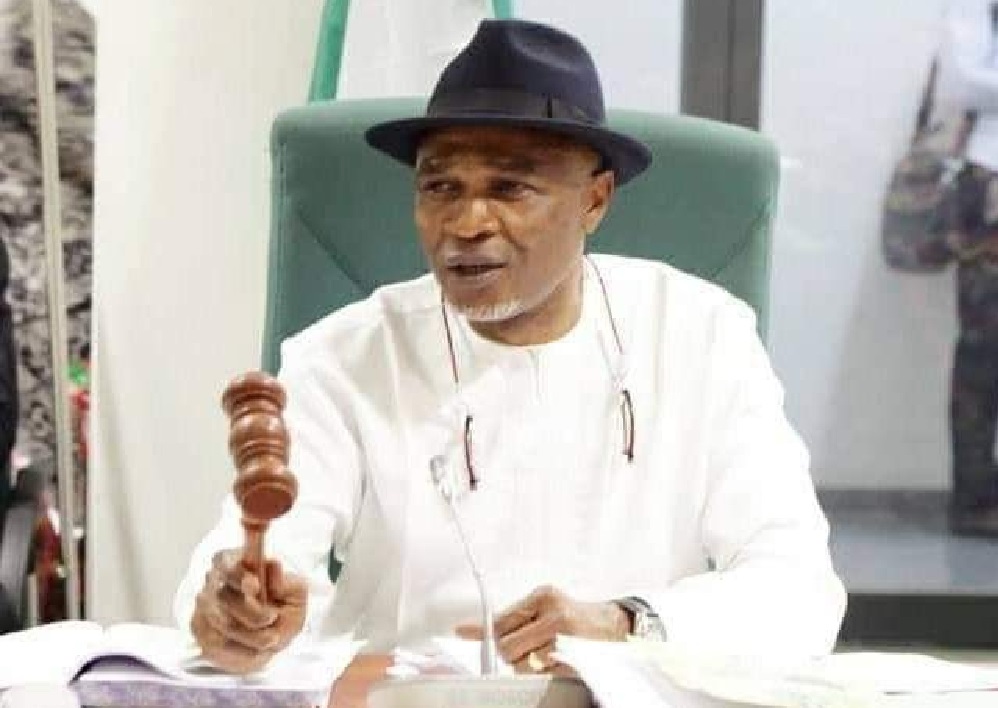
By Gloria Akiba
…says we’ve studied all the demerits and merits of our past parliamentary system
…insists cost of governance will be drastically reduced if we have our own model govt
…the situation now is motion without movement
One of the advocates of a shift from Presidential to Parliamentary system of government in Nigeria, the minority parties caucus leader, Rep Kingsley Chinda has said what is being proposed is an home grown system of government that will benefit all Nigerians from all walks of life.
The Rivers born federal lawmaker representing Obio/Akpor federal Constituency made this disclosure in an interactive session with fellow proponents at the weekend in Abuja.
Hear him:
On recent reactions against the proposed shift by 2031, Chinda said:
“I am one of the strong proponents of the shift from presidential to a homegrown parliamentary system of government.
“Now, yes, we have listened to some criticisms, particularly that of Governor Fashola, who is of the opinion that we should tell Nigerians why the first republic failed and that should be the starting point.
“But I want to assure you that we are not building castles in the air. We took our time to look at the system of government, to look at the problems within the polity, and how, as parliamentarians, we can assist in resolving some of these problems through legislative intervention.
“And then we felt that the entire system that we are practicing is skewed towards failure, one, considering our background, our experiences, our diversity, which, of course, should be an advantage to us.
“And then if you look at the places where systems of government are copied from, they consider their culture, they consider their beliefs; they consider their society in adopting a system of government.
But in Nigeria, we either copy from the United Kingdom or we copy from the United States, without recourse to our background. And that is why we are asking for a homegrown system of government.
“But because we don’t have, perhaps, the proper word to describe it, what we envision is closer to a parliamentary system. And so today, we are asking that we amend our constitution to introduce a homegrown parliamentary system of government.
Now, what led to the failure of the First Republic, whether we had studied it? I will answer Governor Fashola by saying, yes, we have studied it. We have studied deeply the First Republic, the conduct, the successes, and the failure.
“And in doing that, we have even moved to Kano to meet with the only surviving member of the First Republic, Alhaji Dandata and we asked him this question directly. Why did it fail?
And some of his responses were, one, that during the First Republic, many of them were not very well informed as to the system, the rudiments, and the practice. And so to him, that one of the reasons why the parliamentary system failed was ignorance.
“Two, our various tribes and religion and belief in them and then the individual attitude of politicians of that day, which is still in place till today, concerning the issues of power and exercise of power and abuse of discretion.
“And then the constitutional provision that has to do with the sharing of power between the centre and the region. That all these culminated, mainly the power tussle and struggle, culminated into the crisis we had in the South West, which led to the failure of the First Republic.
“And so having heard this, we have also taken into consideration these issues and that’s why we keep saying that it would be wrong for you to introduce a system of government without taking cognizance of your background, where you’re coming from.
“I give you an example. Ask a Nigerian public office holder to exercise discretion today on an issue. He will be influenced by either religion or tribe. Very few public officers in Nigeria will exercise discretion with a neutral background, dispassionately.
“Now, the same public officer, if he is a Briton, asks him to exercise the same discretion, or an American, most often they will look at the nation first in exercising that discretion, most often.
So because we have this inherent issue, it will be difficult for us to import laws that have to do with discretion and bring them hook, line, and sinker to Nigeria and expect it to succeed. It will not succeed.
“We must tweak it to consider our peculiar background. And that’s why we say the time has come for us to move forward.
We’re talking about cost of governance, and government after government has been making attempts to take care of that, either by merging agencies of government or by slashing allowances and salaries of public office holders. How far has that taken us?
“As far as we are concerned, it’s motion without movement. We’re still at the same spot. And so we must do something fundamental if we want to move forward.
And what is that? We have an unwieldy government that is too large for us as a nation to make progress.
“You have the Office of the President and the Office of the Vice President. You have the Office of the Senate President and Deputy Senate President. You have the Speaker and Deputy Speaker. These offices, all of them, come with different budgets.
“You have 360 members of National Assembly. You have the senators. You go down to the states, the same. You have Executive arm, very large.
I can tell you as a parliamentarian today that, well we can decide to say 50% of the salary of every member of parliament will be saved. That will not change much in terms of cost of governance in the country.
“But if we have a situation which we are proposing, commencing from the local government, we try it and see the problems and the successes. If we succeed at the local government level, we move to the next stage, to the state.
And as we are doing this, we will make consequential amendments to relevant laws and then end up at the national. You elect Legislators. There will be no election for the Executive. First, you have saved so much money.
“You can calculate how much we spend on presidential, governorship, and council chairmanship elections.
Now, amongst the councilors, they will elect a chairman and perhaps an assistant, the deputy chairman, amongst themselves. The implication is that any ward that is sending anybody as a councilor will send a chairmanship material as a councilor, unlike what we have today.
“Anybody that is sending any member to the National Assembly will send a member that has the capacity to be the prime minister of the country.
And so you cut down one, number of elections, cost of election, which is the foundation first.
And if you go into governance, as we propose that we have a prime minister who will be the head of the government and a president from Senate who will be ceremonial head.
“What it means is that as a prime minister, you earn the salary of a parliamentarian that you elected as, and you only have perhaps the allowance to function in the office of the prime minister.
Accountability and stewardship is one big problem in our country today, not just corruption.
“You have a situation where different arms of government, the Parliament and the Executive, will appear not to be on the same trajectory. We don’t even know what the other arm is doing.
Recent example, the issues of Central Bank movement to Lagos, Parliamentarians who are not fully informed and aware of the need for that government policy.
“If you have the minister in Parliament and you have a prime minister that will brief the parliament at least every week or once a month, every Parliamentarian will be part and knowledgeable in government policies.
“And then it will be easier and faster for government policies to be executed. It will be less expensive.
When it comes to issues of accountability, we still felt that, look, our laws today, the Nigerian constitution, can allow you exercise discretions that are not morally correct but legally correct. It’s not unlawful, but morally it is wrong.
You have a situation where our president can govern this country for four years without talking to Nigerians. And there is no constitutional provision against that.
“And that’s why in the last government you had the Garba Shehu talking to us. Today you have Ngelale talking to Nigerians. Even during the COVID era, this country was virtually begging her president to address her.
“Other nations hear from their president every month, some weekly. We were begging for it. That is the laws that we have, the system of government that we have.
“And yet people say the Nigerian president is about the most powerful in the world because of the type of presidential system that we are practicing.
Even the American system that we have copied from, you are aware that the Vice President of the United States is the President of the Senate. So why do we have all these offices?
“We spend so much on them. And then we at the same time say that we want to cut down the cost of governance.
Look at our budget. What percentage do we have for capital projects? And what percentage do we have for recurrent? It’s difficult for us to make progress.
“Yes, as difficult as it might appear, as new as it will sound, we think that if we are serious minded, we should be ready to make the sacrifice and leave our comfort zone for the country to make progress.
And that’s why we believe that the time has come for us to start considering a homegrown parliamentary system of government that will suit our country without looking at what others practice outside because the circumstances are not exactly the same.
“So in answer to that question, whether we have considered the reasons why the First Republic failed, yes, we have. And we still believe that a homegrown parliamentary system is the best for us as it stands today.
But we have to take it grade by grade, step by step, from the lowest until we get to the presidential level.
On former President Olusegun Obasanjo’s advocacy for Afro democracy, Chinda said: Obasanjo agreed with us that the current presidential system will not help us much.
And so he is calling for Afro-Democracy, that is African democracy and it is still the same idea, the same ideology that we are proposing.
“What President Obasanjo is saying is that we need an African-grown democratic system that will put into consideration the African culture, the African circumstance, African condition.
But for us, charity begins at home. And that was what we exactly told him. We believe in the Afro-democracy, yes, but charity begins at home.
In that Afro-democracy, we need a Nigerian-grown democratic system.
” And so whilst he is looking at it from the African perspective, perhaps because of his level, he’s no longer a Nigerian leader, he’s an African leader, he’s a universal leader. So he could look at it from that perspective.
“We are representing Nigerians. We are bringing it down home. So we are on the same note, because when we had an interaction with him, we understood ourselves.
And we told him that for us, as parliamentarians of Nigeria, let us start from Nigeria. And then if it works, no doubt other African countries will want to copy. Their system might not be exactly the same with the Nigerian system, but it should be a home-grown democratic system.
On whether the homegrown system has capacity to pull down corruption, he said: “No doubt, it’s not going to be a magic wand that once you introduce it, all the ills of society will be gone. But then it is a better system to check corruption compared with what we have presently.
Now I give you an example. The issues where you have ministers, permanent secretaries, members run after them on oversight function, every now and then, and then you get little or no result.
What is the whole idea of oversight function? You need to monitor expenditure to ensure that monies budgeted are used for the purpose. If you have them amongst you, accountability is higher. It is easier to check them. They know that they are there every week.
“And so again, one of the criticisms that people talk about is that it will lead to instability of government. But if the society is better, there is stronger check. And I tell you that it will also not lead to instability because the whole fear of instability is that it is easy to remove the prime minister.
“The prime minister should do the writing and he will not be removed. And so if you find a prime minister that is corrupt, he knows that it is easy to remove him, unlike the situation we have now.
You can be corrupt and still remain in your office. Nigerians can criticize, Nigerians can complain, but they cannot do much to remove you.
“But this system is self-cleansing. It doesn’t take much to remove you if you are corrupt. And so that will make people in public office to sit up.
And it’s a system that will be a hands-on for all public office holders. It’s not going to be a place for retirement and all that, you know people who are tired, you want some rest, you come up here and from here you can retire. It’s not going to be that kind of place.
Asked whether the proponents have verified documents of past republis, Chinda affirmed saying: “Yes, we have also looked at the copies of the constitution or the laws that were used in the First Republic. There are some, if you look at the conference report, which is very comprehensive, there are some of those laws that you need to reintroduce, but you’re not going to bring back the entire constitution. It will not work.
“There are some laws in our current constitution that are still valid. That’s why I said that over time we’ll be having consequential amendments of our laws. So some laws will go, some new ones will come. Some of the old laws that are fit for purpose could also come in and you tweak them to consider our local circumstance.
News
Mbah mourns ,says Christian Chukwu was a ‘football icon’
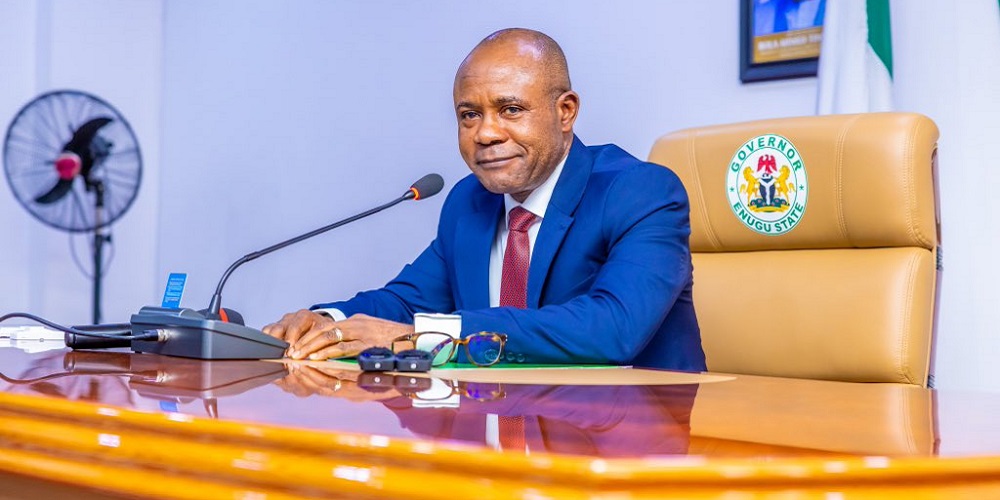
By Kayode Sanni-Arewa
Enugu Governor Peter Mbah has expressed deep grief over the passing away of former Super Eagles skipper and coach, Christian Chukwu, describing him as a football icon, titan, and phenomenon.
Reacting to the development on Saturday Mbah said: “I received with a deep sense of loss the passing away of Chairman Christian Chukwu. It is a personal loss to us as Ndi Enugu, his home state, and indeed to Nigeria as a nation and Africa as a continent.
“Christian Chukwu was a national icon, a football titan, field marshal, and phenomenon. His exploits as a footballer united the country across ethnic divides and creed.
He was patriotism personified, serving the nation and Africa unreservedly both as a player and coach of the highly successful Rangers International Football Club of Enugu and Super Eagles of Nigeria, which he captained to victory as Green Eagles at the 1980 Africa Cup of Nations, AFCON. He also coached the Harambee Stars, Kenya’s senior male national team, among others.
“Chairman, as he was fondly called, gave his all not only to the nation but to the rest of Africa. He wrote his name in gold in the annals of the history of Nigerian and African football.
Our dear legend has gone the way of all mortals, but the fond memories and the pride he gave Ndi Igbo and Nigeria as a whole will be cherished forever.
“My heart goes out to his family, Ndi Enugu, the Nigerian sports community and the entire nation over this irreplaceable loss. May the good Lord grant his soul eternal repose.”
News
Just in: Boko Haram IED Blast Kills Seven Along Maiduguri-Damboa Road
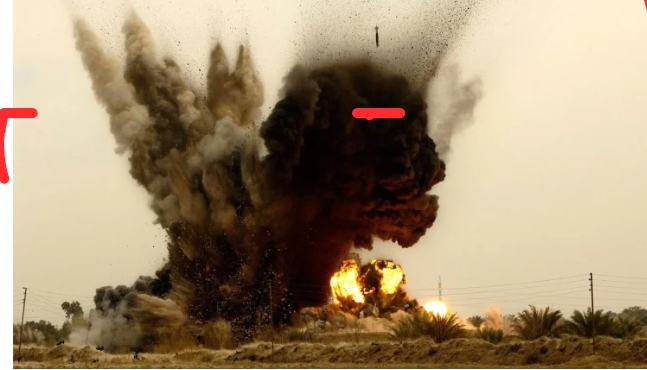
By Kayode Sanni-Arewa
No fewer than seven people lost their lives on Saturday following the detonation of an Improvised Explosive Device (IED) planted by Boko Haram terrorists in Borno State.
The deadly incident occurred along the Maiduguri-Damboa Road, a notorious route that cuts through the Sambisa Forest—an area long plagued by insurgent activities.
The victims were part of a convoy of vehicles being escorted by the military from Damboa to Maiduguri.
According to eyewitness accounts and local sources, the explosion struck as the convoy—organized to provide safe passage through the volatile region—was underway. Several other passengers sustained varying degrees of injuries and were rushed to a hospital in Maiduguri for urgent treatment.
The Maiduguri-Damboa Road serves as a vital link between the state capital and several local government areas in southern Borno, including Chibok and Gwoza.
For years, the route remained closed to civilian traffic due to persistent terrorist threats. However, under the administration of Governor Babagana Zulum, the road was reopened, with military escorts deployed to accompany travelers twice weekly after clearing the area for explosives.
Saturday’s attack raises fresh concerns about the safety of the corridor, despite consistent military presence. The blast also comes just days after Governor Zulum publicly raised alarm over renewed Boko Haram activity in the state, highlighting the persistent threat the group poses to peace and development in the region.
Authorities are yet to release an official statement on the incident, while investigations and security operations in the area continue.
News
Insecurity: Criminals Cart Away NSA Ribadu’s Office Hilux During Juma’at Prayer In Abuja
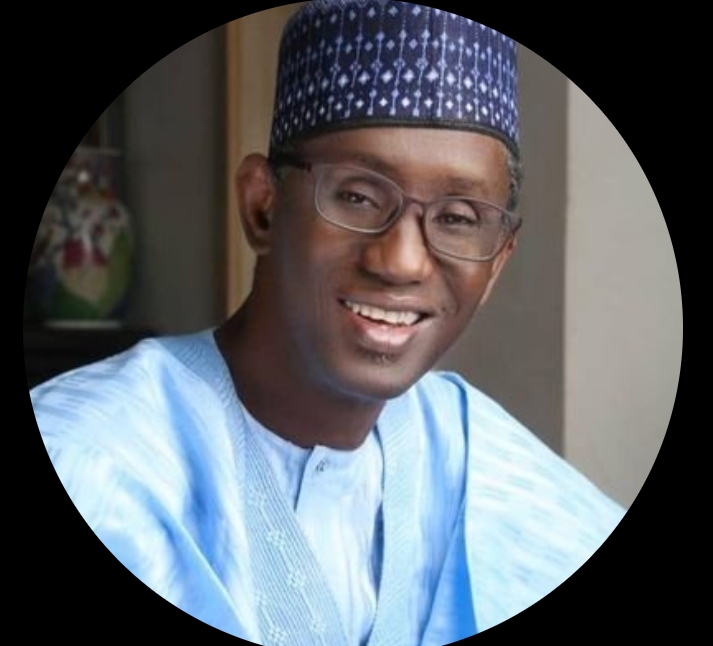
By Kayode Sanni-Arewa
The Federal Capital Territory (FCT) Police Command has initiated a search following the theft of a black Toyota Hilux vehicle belonging to the Office of the National Security Adviser (ONSA), Nuhu Ribadu, which was stolen during Friday’s Juma’at prayers in Abuja.
It was gathered that the vehicle was parked around 1:05pm opposite the Abuja Municipal Area Council (AMAC) complex in Area 10, while the official attended prayers at a nearby mosque.
Security source, Zagazola Makama, disclosed the incident via his X (formerly Twitter) handle, revealing that the ONSA official returned from the mosque only to find the vehicle missing.
According to him, a sources said the theft was immediately reported to the Garki Police Division at approximately 2:00 p.m., leading to a swift response by law enforcement.
Meanwhile, the FCT Police Command promptly activated a stop-and-search operation at various checkpoints and across all entry and exit points in the capital city.
Police authorities confirmed that investigations are ongoing and all efforts are being made to apprehend the culprits and recover the vehicle.
The Command said it had intensified efforts to track down the fleeing suspects and recover the stolen Hilux.
-
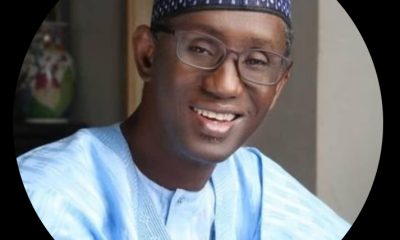
 News14 hours ago
News14 hours agoInsecurity: Criminals Cart Away NSA Ribadu’s Office Hilux During Juma’at Prayer In Abuja
-

 News23 hours ago
News23 hours agoSad! Explosion rocks Lagos
-
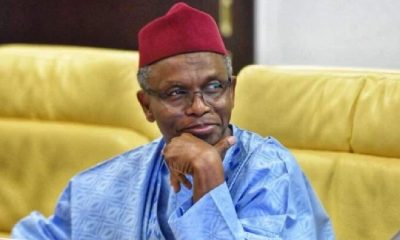
 News23 hours ago
News23 hours agoWe only had lunch with Buhari not 2027 politics -El-Rufai
-

 News23 hours ago
News23 hours agoParts of Abuja, Niger in total darkness -AEDC confirms
-
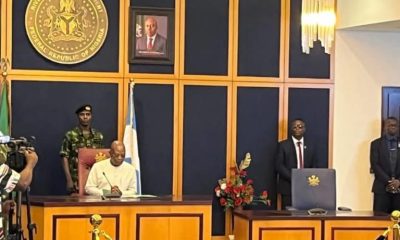
 News22 hours ago
News22 hours agoIbas gives reasons why Sole Administrators were appointed for Rivers councils
-

 News18 hours ago
News18 hours agoOERAF Rounds Up Late Chief Ekuogbe Rowland Akpodiete’s remembrance with Novelty Match
-
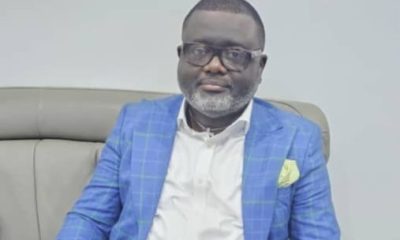
 Opinion17 hours ago
Opinion17 hours agoDismantling the false Narrative of a “Coup” in Rivers State
-
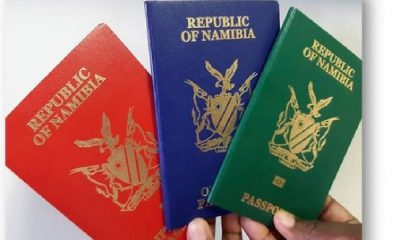
 News21 hours ago
News21 hours agoFive countries with easy work visas in 2025




